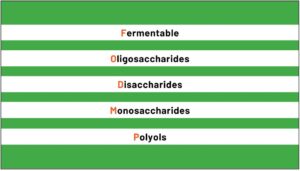Gastrointestinal health is a crucial aspect of overall well-being, yet it often gets overlooked. A significant portion of the population experiences digestive disorders that can significantly impact their daily lives. For digestive issues, the low FODMAP diet has been established to be useful for the management of these problems.

Source: Canva
This article provides insights into the low FODMAP approach, explaining its benefits for digestive health and why individuals should consider adopting this diet.
Understanding FODMAPs
FODMAPs are a group of fermentable carbohydrates found in various foods. The acronym FODMAP stands for:

Source: Canva
These carbohydrates are not all digested in the small bowel but pass through to the large bowel, where bacteria break them down, releasing gases and promoting watery changes in the bowel.
Symptoms such as stomach bloating, gas, abdominal pain, and diarrhea may also arise during the fermentation phase, particularly among individuals with IBS and other functional gastrointestinal disorders.
The Low FODMAP Diet
The low FODMAP diet was therefore established through research by Monash University in Australia and aids people living with IBS. The diet is divided into three phases:
- Elimination Phase: For 4-6 weeks, individuals should avoid all high FODMAP foods. This helps identify whether FODMAPs are contributing to symptoms.
- Reintroduction Phase: Foods are gradually reintroduced one at a time to identify which specific FODMAPs trigger symptoms.
- Personalization Phase: A personalized diet is developed based on the individual’s tolerance to various FODMAPs, allowing them to manage symptoms while enjoying a varied diet.
How Low FODMAP Diets Improve Digestive Health
Reduction of Digestive Symptoms
As for the advantages of a low FODMAP diet, one can identify its main purpose, the elimination of digestive complaints. Adopting the low FODMAP diet, statistics reveal, improved symptoms like bloating, gas, abdominal pain, and diarrhea in up to 75% of IBS patients.
Thus, due to the decrease in the consumption of fermentable carbohydrates, one experiences less formation of gas and limiting water entry into the large bowel hence a correct bowel movement.
Improved Gut Motility
FODMAPs cause changes in bowel movements where they can make the gut either move faster than it normally should or be slower than normal. This can lead to either loose stools or hard stools depending on the type of stimulation that has been given to the Gastrocolic reflex.
The rationale for why individuals cope better with a more comprehensive intake of FODMAPs is that it enables them to experience more consistent bowel movements and minimize the aspects of gut motility instability caused by IBS.
Better Nutrient Absorption
High FODMAP foods may also reduce the uptake of some nutrients depending on the specific products consumed. For instance, an increased rate of fermentation and short gut transit time can help hinder the efficient absorption of minerals and vitamins.
By avoiding foods that produce high FODMAPs and also limiting foods that undergo a lot of fermentation, nutrient intake is enhanced hence improving body health status.
Reduced Inflammation
Whenever an individual has a persistent gastrointestinal condition, this causes the development of inflammation within the gastrointestinal tract and hence, worsens the condition of the affected individual.
This eats up a lot of energy and creates a lot of inflammation; maintaining a low FODMAP diet means avoiding the substances that cause such inflammation and therefore resetting the gut’s state.
Practical Tips for Following a Low FODMAP Diet
Consult a Dietitian
Entering a low FODMAP diet can be tiresome without some basic guidance from a professional. Limiting and avoiding certain foods and maintaining dietary guidelines for IBS can be challenging for the patient, and consulting a dietitian who has specialized in digestive diseases can assist in food selection, advice, and support during the process.
However, if you want to implement it on your own, having a low fodmap diet meal delivery can provide convenience for you. This can help in plain and proper adherence to the diet requirements to minimize the occurrence of nutrient deficiency.
Keep a Food Diary
One of the best ways to track changes is to record everything that is eaten during the elimination and reintroduction processes to pinpoint the foods that cause discomfort. As mentioned, make a diary where one writes down all the food consumed, any symptoms felt, and other factors such as stress and physical activities.
Use Reliable Resources
To assist individuals in the implementation of a low FODMAP diet, there are various applications, culinary, and websites that were designed by researchers and dietitians.
Plan Meals Ahead
Several techniques that can assist in the implementation of a low FODMAP diet include; meal planning. The preparation of low-FODMAP snacks in advance, together with not having precooked high-FODMAP foods, can be useful when one has no time. Maintaining an array of low FODMAP meal preparations can also enhance food diversity and sustainability.
Be Patient and Persistent
However, the low FODMAP diet is a challenging approach that requires time and effort to follow. Finding triggers and effective strategies may take time and experimentation.
But this, together with the potential benefits for the general health of the digestive tract, should sufficiently compensate for the efforts. People should expect that they will make mistakes with some of their experiments and they need to be persistent.
Common Misconceptions About the Low FODMAP Diet
It’s a Lifetime Diet
One could even assume that following the low FODMAP diet is a permanent way of living. This diet is only an elimination diet, where one abstains from certain foods to see which foods cause a reaction, after which one is supposed to reintroduce as many of the eliminated foods as possible.
The goal is achieved gradually and has the ultimate goal of creating an individualized eating plan that aims at reducing the symptoms yet does not restrict the type of food consumed.
All high-FODMAP foods Must Be Avoided Forever
The other phenomenon is that people believe that it is crucial to always avoid FODMAP foods with high values. In the process of demutualization, people discover that some of the foods that are high in FODMAPs can be consumed to some extent or occasionally.
This increases the amount of pleasure that one can derive from the kinds of foods consumed without necessarily deteriorating the quality of one’s health.
It’s Only for IBS
Although the low FODMAP diet is mainly used for IBS and has been evidenced to be effective in managing its symptoms, the diet is also beneficial for the management of SIBO and functional dyspepsia. Nevertheless, it is necessary to turn to experts and choose how to act in a particular situation depending on a specific illness or disease.
Conclusion
The low FODMAP diet is proven to be beneficial for reducing IBS symptoms and is endorsed by health professionals as a potentially exciting but powerful solution. By the low amount of fermentable carbohydrates used in this diet, the sufferers are largely able to minimize instances such as bloating, gas formation, abdominal pain, and irregular bowel movements.
As for certain difficulties and nuances of the key approach, it is crucial to notice that it indeed takes time and careful following, yet it can and does significantly change the condition of the guts and, consequently, the quality of life of many people.
This type of diet should not be mistaken for a fad diet because, with the proper training and support, one can provide for his/her digestion needs for the long term.
FAQs
1. Is the Low FODMAP diet suitable for everyone?
While the Low FODMAP diet is effective for many, it is not suitable for everyone. It is essential to consult with a healthcare provider or dietitian before starting the diet, especially for individuals with other health conditions or dietary needs.
2. Can the Low FODMAP diet lead to nutritional deficiencies?
The elimination phase of the Low FODMAP diet can potentially lead to nutritional deficiencies if not managed properly. It is important to work with a dietitian to ensure that the diet remains balanced and nutritious throughout all phases.
3. How long should one stay on a Low FODMAP diet?
The elimination phase typically lasts 4-6 weeks. After that, foods are reintroduced to determine tolerance levels.





